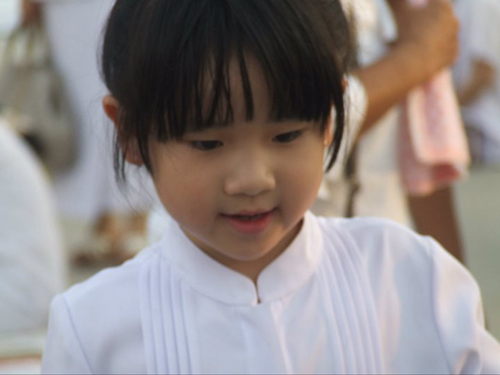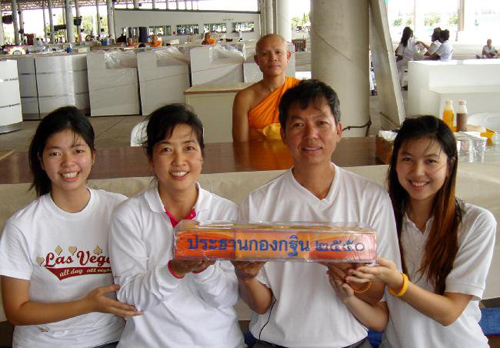Blessing Thirteen:
Cherishing our husband or wife A. INTRODUCTION
A. INTRODUCTION
A.1 Aim in Life: Marriage versus celibacy
In some cultures, such as those of Indonesia, there are only two logical answers to the question, “Are you married?” — “Yes” or “Not yet”! Western culture might not see marriage as quite so much of an obligation, but it should be declared from the outset with, that just because the Buddha says “Cherishing One’s Spouse” is a blessing, does not mean there are not superior ways to become blessed! Rather than advocating marriage, what the Buddha meant in teaching this blessing is to remind us to avoid the dire consequences of having a spouse and not cherishing them. Marriage can be a minefield — thus, if you don’t have a spouse and don’t plan on procuring one, you can skip this Blessing with a sigh of relief.For westerners, marriage has traditionally been portrayed as the high-point of happiness in life. The fathers of western attitudes — the Ancient Greek philosophers — have seeded the delusion of idyllic matrimony with the sentimental idea about a man and women mutually searching for the “other half” who will make them complete (— oblivious to the fact that you could say the same about rabbits, ducks, crows or any other sort of animal fulfilling its urge to mate). Consequently, celibacy does not feature visibly as a demographic option in the west.Buddhism, by contrast, bases its practices on the conviction that every person can be complete in themselves if they train themselves earnestly. As mentioned in Blessing Six, Buddhism idealizes the “exclusively spiritual” aim in life and thus the Buddha advocated a life of celibacy because life as a couple always leads to compromises in the intensity to which one can cultivate ultimate peace and purity of mind. In many non-western cultures around the world, celibacy is an option chosen more and more by professionals, especially women, who want to devote their time and efforts to their life’s work — they realize that otherwise, because of the expectations of society, marrying would involve a conscious decision to drop their career. It is also traditional in many Asian cultures for couples to become celibate in their married relationship after their own children have grown up and left home. Those with the inner strength to renounce the married life can thereby enter the “fast-lane” of spiritual development — however, in practicality; renunciation of the married life is difficult, because it requires the ability to see through the illusory nature of the self and of the sense-pleasures. Most people realize the truth only when they are already married and are find themselves saddled for the rest of their lives with the more detestable side of their partner.Buddhism accepts the reality that renunciation is not for everyone, and thus does not decry marriage. Even if the idea of renunciation appeals to you, once married you cannot just shrug off the duties you have taken on yourself — you need to take proper responsibility for creating happiness in your marriage — to make a success of the path of life you have chosen for yourself. Although the married life doesn’t correspond to the highest of aims in life, nonetheless, if one can cultivate contentment with one’s spouse and thereby avoid promiscuity— it can give considerable leverage in one’s self-development. Creating success in marriage is a major way of cultivating goodness of character. It is to such readers that this Blessing is directed. Wrongly approached marriage can be a nightmare turning the closest of lovers into the worst of enemies. By contrast a properly fulfilled marriage will be long lasting, avoiding the bitterness of divorce and creating blessings both for that couple and for society as a whole.However, be warned! Most of the content of the Buddhist Scriptures deals with monastic issues and thus tend to idealize those who see through the folly of their marriage, subsequently renouncing the world or those who marry only reluctantly out of respect for their parents’ wishes, renouncing the world after the passing of their parents.A.2 Long-term Relationships: Marriage versus “living together”
Buddhism advocates celibacy, it tolerates marriage, but prohibits promiscuity under its definition of “adultery”. Although Buddhism’s definition of marriage is not black and white (see @C. below) it is clear that Buddhism does not support sexual relations between partners who take no responsibility for one another or the possible consequences of their liaisons. Let us examine the worst scenario for some of the material and abstract issues touched upon as the consequence of sexual relationships:1. sexually transmitted disease (possibly fatal)
2. pregnancy (possibility of handicapped child or subsequent miscarriage)
3. emotional trauma and regret
4. damage to reputation
5. general undermining of health
6. erosion of deeper meaning in the relationship by ephemeral pleasuresBuddhism prohibits abortion (murder of an unborn child) but does not prohibit contraception. Recourse to contraception might superficially seem to remove responsibility for “1” and “2” above — but closer examination reveals that contraception does not offer 100% protection from either. Who is going to be there for the girl to comfort her if she has a miscarriage? Who is going to pay for the upbringing of a child born out of wedlock? Will he still love her if she is disfigured by infection with HIV? These are consequences which apply irrespective of the cultural traditions of the society you find yourself in. The reader can answer for themselves what sort of relationship a couple needs to have built for themselves to be willing to shoulder all six of these possible risks implicit in their sexual liaison. For a couple to face up mutually to the responsibilities of living together and having sexual intercourse, demands enormous sacrifices on both sides. It is these sacrifices and responsibilities the Buddha teaches about in the Thirteenth Blessing. On a brighter note, living together should not be the “end” of young peoples’ idealism— it can and should be the start of something yet more beautiful.At this point, it should be added however, that the western mass media consistently lull the public into a false sense of security concerning the risks of promiscuous sex.A.3 Sexual discrimination in Buddhism?
In this day and age, many people are concerned about equal rights for men and women, but find that religions often harbour the worst of sexual discrimination. Before embarking upon the advice to married couples that follows, it is necessary to qualify the advice by saying the temperament of men and women are not the same in the eyes of the Buddha. Masculinity and femininity are distinct qualities equivalent to the elements of earth, water, fire and air that make up our bodies. One is not superior to the other, but harm can come about when one becomes enamoured these features of one’s own or another’s gender (e.g. Saṃyoga Sutta A.iv.57). It is the attraction between the genders that causes harm, not the gender qualities themselves, because:“no sight, sound, scent or touch can overcome the mind of a man like those of a woman and no sight, sound, scent or touch can overcome the mind of a woman like those of a man”
Rūpādi Sutta A.i.1And for as long as a man or a woman is under the control of the attraction they have for someone of the opposite gender, they will fail to make use of their nobler virtues such as wisdom and conscience. They will tend to forget that love has a nobler side which is motherly, brotherly, selfless or universal in place of love which is merely sensual, emotional, sexual or downright selfish.That women are often shown in a bad light in the Buddhist scriptures does not reflect the quality of women per se, but we because women are mostly referred to in stories used to threaten monks on the brink of disrobing (a relatively common reason for the Buddha to give a teaching). Elsewhere the Buddha shows women in a good light and admits that women have an equal chance of becoming enlightened as men.A.4 Disadvantages of not cherishing one’s spouse
With or without divorce, the consequences of marital neglect are far-reaching. If a husband and wife do not cherish one another according to the advice of the Buddha, the harm that will come to them can be concluded on three levels:1. Losing a sense of responsibility for their own human dignity: If a husband and wife lack self-discipline and don’t fulfill the duties towards one another prescribed by the Lord Buddha, the first level of disaster which will happen to them is that they will lose their sense of responsibility for their own human dignity — this loss giving rise (at the minimum) to the following three undesirable symptoms:
1) Breaking the Precepts: The husband and wife might be unfaithful to one another leading to family problems, divorce, vengeful aggression and violence;
2) Running out of inspiration to perform virtue: When someone feels disappointed with life, the last thing they want to do is to be a good husband or wife to their partner or a good parent to their children;
3) Displaying violence in front of their children: If a parent has no respect for themselves, they will feel no embarrassment about losing their temper or being aggressive in front of the children. Such aggression, even if it is only verbal, leaves an inerasable traumatic impression on the children’s developing mind quenching any possible warmth they might feel for that parent in the future;2. Losing a sense of responsibility for the human dignity of others: If a husband and wife lack self-discipline and don’t fulfill the duties towards one another prescribed by the Lord Buddha, the second level of disaster which will happen to them is that they will lose their sense of responsibility for the human dignity of others — this loss giving rise (at the minimum) to the following three undesirable symptoms:
1) Pessimistic world-view: If a husband and wife habitually loses their temper with colleagues or friends outside the home, it will eventually retard career progress and promotion prospects;
2) Biased personality: The insecurity of family life will lead them to take refuge within a clique of sympathizers, thereby losing the ability to associate sincerely with a wider society;
3) Accumulation of anger and vengefulness: The husband or wife will start to accumulate negative emotions because they feel that everybody is against them — eventually they become preoccupied with looking for ways to “get their own back on these “enemies”.3. Losing a sense of responsibility for economic fairness in society at large: If a husband and wife lack self-discipline and don’t fulfill the duties towards one another prescribed by the Lord Buddha, the third level of disaster which will happen to them is that they will lose their sense of responsibility for economic fairness in society at large — this loss giving rise (at the minimum) to the following three undesirable symptoms:
1) Recourse to “Roads to Ruin”: If husbands or wives lose their sense of responsibility for economic fairness, eventually they will turn to “Roads of Ruin” such as alcohol for solace, in an attempt to “blot out” their suffering.
2) Economic hardship for the family: When the finances of the family are misdirected, the ones who suffer the most will be the children who experience neglect in their material and educational needs — exacerbating problems of juvenile delinquency;
3) Lack of harmony in earning livelihood: when the relationship between husband and wife is plagued by mistrust and suspicion — if the couple eventually has to break-up, the certain victims will be the children in the family.The problems of the western quarter can be summarized down to two main points:
1. Broken families: The manifest problem of broken families in our society exacerbates the already grave problems faced by young people as well as affecting a country’s economic stability;
2. Misunderstanding of marriage: The covert social problem of misunderstanding of marriage stems from the fact that young people are getting married for the wrong reasons. Without any comprehension of how to lead a household, a majority of couples these days seem to be marrying merely to fulfill their sexual fantasies. However, once married, when the reality of the situation sinks in, they find themselves ill-equipped to make a success of the family life. It is ironic that “sex education” has become a compulsory school subject at a time when society is plumbing the depths of marital problems and promiscuity. In the olden days “sex education” was not taught, but somehow the “man-in-the-street” seemed to make less of a mess of his marital life! Maybe what they should be teaching in schools instead of “sex education” is “how to prepare yourself to be a good husband/wife?” or “how to prepare yourself to be a good parent?”
Tags : #การแต่งงาน #การใช้ชีวิตคู่ #ความรัก #ความรับผิดชอบ #การทำให้คู่รักมีความสุข #การบำรุงรักษาความสัมพันธ์ #ปัญหาครอบครัว #การเลี้ยงดูบุตร #ศีลธรรม #การให้เกียรติคู่สมรส #การบำรุงรักษาความสัมพันธ์ #การเลี้ยงดูบุตร #การใช้ชีวิตคู่ #การให้เกียรติคู่สมรส #ความรัก #ความรับผิดชอบ #ความสัมพันธ์ #ปัญหาครอบครัว #ศาสนาพุทธ #แต่งงาน










